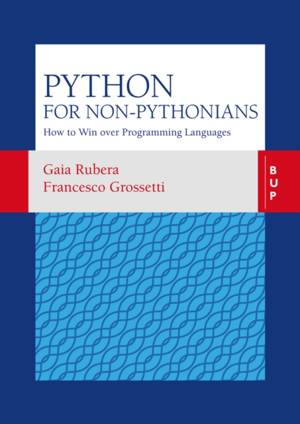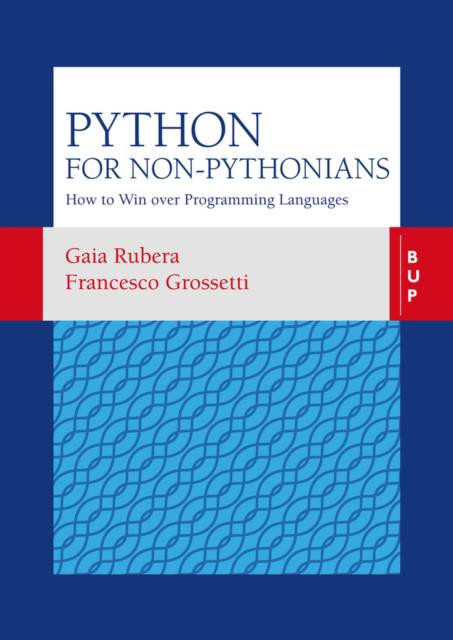
Bedankt voor het vertrouwen het afgelopen jaar! Om jou te bedanken bieden we GRATIS verzending (in België) aan op alles gedurende de hele maand januari.
- Afhalen na 1 uur in een winkel met voorraad
- Gratis thuislevering in België vanaf € 30
- Ruim aanbod met 7 miljoen producten
Bedankt voor het vertrouwen het afgelopen jaar! Om jou te bedanken bieden we GRATIS verzending (in België) aan op alles gedurende de hele maand januari.
- Afhalen na 1 uur in een winkel met voorraad
- Gratis thuislevering in België vanaf € 30
- Ruim aanbod met 7 miljoen producten
Zoeken
Python for Non-Pythonians
How to Win Over Programming Languages
Francesco Grossetti, Gaia Rubera
Paperback | Engels
€ 48,95
+ 97 punten
Omschrijving
The book uses a very simple and accessible language. All the descriptions of Python functionalities come with intuitive examples to make you learn by doing. This is not a theoretical book and does not cover some of the most internal features of Python. The intention of the authors is to allow business-oriented people to start using Python. The main reason for such a choice of style is due to the increasing number of requests by non-technical professionals to solve daily problems and tasks. Whether the reader wants to append multiple spreadsheets or profile their customer base, being able to use a solid infrastructure which can collect, check, process, analyze data, and report results has become a basic requirement in most industries. The book first introduces the building blocks of Python which can be compared to the different types of words of a language. It introduces readers to the syntax rules of Python--statements, functions, and classes. It then introduces how to use this new language for managing data. As making mistakes is common in programming, learning how to interpret the error messages and fix codes is extremely important from a pedagogical perspective. The book challenges students with a series of "fix the code" questions at the end of each a topic. Students will learn how to successfully write algorithms in Python when they understand its logic and the meaning of each element of the algorithm.
Specificaties
Betrokkenen
- Auteur(s):
- Uitgeverij:
Inhoud
- Aantal bladzijden:
- 178
- Taal:
- Engels
Eigenschappen
- Productcode (EAN):
- 9788885486867
- Verschijningsdatum:
- 1/07/2019
- Uitvoering:
- Paperback
- Formaat:
- Trade paperback (VS)
- Afmetingen:
- 163 mm x 234 mm
- Gewicht:
- 294 g

Alleen bij Standaard Boekhandel
+ 97 punten op je klantenkaart van Standaard Boekhandel
Beoordelingen
We publiceren alleen reviews die voldoen aan de voorwaarden voor reviews. Bekijk onze voorwaarden voor reviews.









